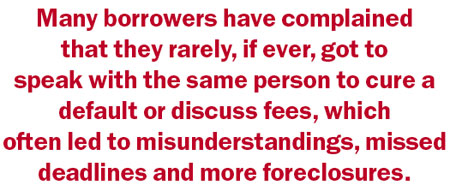
When you take out a home mortgage, do you expect to be treated fairly and competently by your bank or loan servicer?
Most likely you do. But the widely publicized “robo-signing” and foreclosure scandals suggest that for thousands of homeowners, fair dealing and competence have not been routinely available at some of the largest mortgage servicing operations in the country.
According to witnesses at recent congressional hearings:
• Borrowers with on-time payment histories who sought loan modifications frequently were told they needed to stop payments for two to three months before they would be eligible to even discuss possible changes to their loan terms. When they applied for modifications, they were sent foreclosure notices because they were in default.
• Major lenders and servicers often put borrowers on a “dual-track” system — negotiating loan modifications and trial payment plans under federal programs while simultaneously initiating foreclosure procedures.
• Servicers pyramided late fees and other penalties, swelling borrowers’ debts to the point where they were so large that foreclosure became inevitable. According to Diane E. Thompson, counsel to the National Consumer Law Center, $30,000 in fees were added to one homeowner’s principal balance by a bank during the seven months it took to process her modification request.
• Servicers’ sloppy documentation in loan files often has led to unjustified foreclosures and high fees. Some of the most blatant errors involve property insurance records. In one case in Maine, a homeowner was informed that his hazard insurance policy had lapsed and the bank “force-placed” a policy of its own for two years. The force-placed policy required premium payments of $8,500 a year, despite the fact that the homeowner had a valid insurance policy providing superior coverage at a premium of just $550 a year.
Reported abuses such as these have led to hundreds of lawsuits against banks and servicers that are clogging court calendars nationwide. But now state attorneys general have banded together in an effort to negotiate a broad, national settlement with the 14 biggest banks and servicers.
The draft proposal — still far from final agreement, say participants in the negotiations — calls for billions of dollars in penalties from the banks, along with additional billions in principal reductions for distressed and underwater borrowers.
Though the principal reductions have received most of the attention in media coverage of the proposed settlement, the core of the agreement would essentially amount to a new mortgage servicing bill of rights for borrowers. It sets out minimum standards and operating procedures that would govern how homeowners are treated in the future.
Here’s a quick overview of how the draft settlement could change the rules of the game. Tops on the list: Servicers would be required to employ enough trained loss-mitigation staff to deal with all borrower inquiries and requests for loan modifications, and be able to identify the bank or investor that is the legal owner of the mortgage. This may sound like a no-brainer, but in some foreclosure lawsuits, servicers have been unable to document the identity of the investor that owns the loan to the court’s satisfaction.
Equally basic but rarely available today: Servicers will have to provide mortgage customers with a “single point of contact” — a designated employee, with a name and contact information — for their loan modification requests. Many borrowers have complained to state attorneys general and to Congress that they rarely, if ever, got to speak with the same person to cure a default or discuss fees, which often led to misunderstandings, missed deadlines and more foreclosures. Julia Gordon, senior policy counsel at the Center for Responsible Lending, says “it’s stunning that this has not been done” as standard operating procedure in the past.
Dual-tracking of modifications and foreclosures would be banned outright by the proposed settlement agreement. Servicers would be prohibited from advising on-time customers to default, or discouraging borrowers from seeking help from nonprofit counseling organizations. And force-placed insurance practices would be severely limited, including prohibitions on obtaining high-premium policies from subsidiaries or affiliates of the lender or servicer, or accepting kickbacks from insurance companies for force-placed policy purchases.
Banks involved in the negotiations have not said much publicly about the proposed servicing rule changes. A Bank of America spokesperson declined comment on the entire issue.
But keep an eye on this: If the settlement occurs, it could give significant new protections to homeowners and borrowers, even if they’ve never had a payment problem or a need to modify their mortgage terms.
Ken Harney is a syndicated real estate columnist.